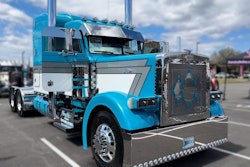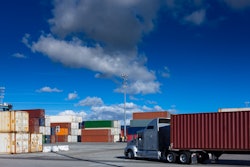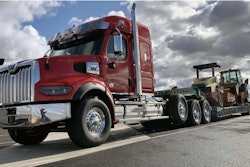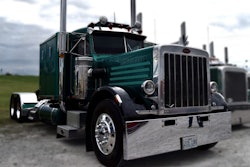Trucking news and briefs for Friday, June 6, 2025:
Senate proposes changes to AI-tech regulation provision in 'One Big Beautiful Bill'
Lurking in the text of the House of Representatives' "One Big Beautiful Bill Act" budget legislation is a provision that would place a ban, essentially, on states "limiting, restricting, or otherwise regulating artificial intelligence models, artificial intelligence systems, or automated decision systems" in interstate commerce, according to the text of the legislation.
If such were to become law, the definition would seem to put the brakes on nascent legislative efforts to backstop safety and employment opportunities in the face of increasingly capable automated trucks and driving systems like Aurora's "Driver" and others.
Some Republicans in the U.S. House, despite voting for the measure, have begun speaking up against it, and it saw significant proposed modification in the Senate Commerce Committee's efforts to draw up a version of the legislation to reconcile with the passed House version. That House version would have prohibited enforcement of such AI-restrictive laws or regulations by states for a period of 10 years.
Per reporting in Politico, Senate Republicans have proposed to make "the legal freeze" on state laws "a prerequisite for receiving internet expansion grant money" from the federal "Broadband Equity, Access, and Deployment, or BEAD, program."

In essence, for states, enforcement of any AI-related regulation would mean no access to those federal monies for expanding broadband, instead of a blanket prohibition of limiting or restricting AI through regulation.
[Related: 'One Big Beatiful Bill' that could be prettier for company drivers]
Such a provision, if it becomes law, would put up roadblocks in the way of efforts like the Texas House of Representatives' recent consideration of a prohibition on removing human drivers from the cab of an automated commercial vehicle in operation. That legislation, following two unsuccessful similar attempts in California in prior years (both vetoed by the governor), advanced from committee in Texas by an 11-2 committee vote shortly following the Aurora Innovations company's public communications that it had launched commercial "driverless" operations along the Houston-Dallas lane there.
Subsequent announcements by the company revealed Aurora's truck manufacturer partner concerns about the move, as the company put an operator back in the driver's seat. The same Aurora communication noted an "observer" had "been riding in the back of some of our trips," presumably in the sleeper.
It's worth noting legislation introduced in the Texas State Senate late in May would do essentially the opposite of the House prohibition on driverless vehicles. Among provisions of SB 2425 is one that stipulates "neither a licensed human driver nor a license ... is required to operate an automated motor vehicle if the automated driving system installed on the vehicle is engaged."
In addition to recent Congressional moves at the federal level, regulators in April signaled support for advancement of autonomous vehicles, as previously reported, with Department of Transportation Secretary Sean Duffy's "Innovation Agenda" aimed to streamline regulation around autonomous vehicles away from a 50-state patchwork approach. Much of the agenda appeared to be focused on passenger AVs.
[Related: Texas legislators float driverless truck ban]
Senator calls for investigation into TuSimple for potentially sending sensitive info to China
A U.S. Senator has called on the Department of Justice to launch an investigation into TuSimple, a Chinese autonomous trucking company that operated in the United States from its founding in 2015 until it ceased U.S. operations in late 2023.
Sen. Josh Hawley (R-Missouri) on May 30 penned a letter to Attorney General Pam Bondi, urging the investigation into TuSimple “for potential violations of U.S. export controls, unauthorized transfers of sensitive technology to the People’s Republic of China, and any associated breaches of national security.”
In the letter, Hawley pointed to an investigation by the Wall Street Journal that found “TuSimple systematically shared proprietary data, source code, and autonomous driving technologies with Chinese state-linked entities, in blatant disregard of a 2022 national security agreement with the Committee on Foreign Investment in the United States (CFIUS).”
The Journal reported that TuSimple (now CreateAI) sent “a trove of data” of an American autonomous vehicle system to a Beijing-owned company after it agreed with CFIUS not to share data with Chinese entities. WSJ alleged that TuSimple paid a $6 million settlement without admitting fault.
“These reports also revealed communications from TuSimple personnel inside China requesting the shipment of sensitive Nvidia AI chips and detailed records showing ‘deep and longstanding ties’ with Chinese military-affiliated manufacturers,” he added. “To date, TuSimple has not faced serious consequences for sharing American intellectual property with China.”
[Related: Autonomous truck crash draws federal attention]
Hawley said that if the reports are true, “they represent not just a violation of export law, but a breach of national trust and a direct threat to American technological leadership.”
“The American people deserve to know how and why a supposedly U.S.-based company was allowed to serve as a conduit for the transfer of sensitive innovations to the Chinese Communist Party,” he added.
Specifically, Hawley asked Bondi and the DOJ to answer these questions during the requested investigation:
- Did TuSimple provide protected information to Hydron, Foton, BAIC Group, or any other affiliated Chinese entity?
- What steps has the Department of Justice taken to ensure that Bot Auto – a new, Texas-based self-driving truck company staffed with former TuSimple employees and backed by Chinese capital – does not engage in similar behavior?
- What activities were covered by TuSimple’s national security agreement with CFIUS?
- What were the infractions of this agreement for which TuSimple paid a $6 million settlement?
- Are CFIUS-brokered national security agreements adequate mechanisms for controlling high-risk companies with known ties to the Chinese Communist Party?
[Related: FMCSA closes investigation into autonomous truck crash]
Truck Parking Club surpasses 2,000 locations
Truck Parking Club announced this week that it has surpassed 2,000 Property Member locations across all lower 48 states, providing more than 40,000 reservable truck parking spaces for truck drivers.
The milestone represents a doubling of locations in just six months, the company said, driven by demand for parking and property owners looking to monetize unused space.
"This isn't just about hitting a number -- it's about solving a decades-old problem that costs the trucking industry billions annually," said Evan Shelley, co-founder and CEO of Truck Parking Club. "Every new location means drivers spend less time searching and more time earning. Our goal is clear: reduce parking search time to under 10 minutes per day."
The company's network includes property types from trucking company yards and repair shops to storage facilities, managed spaces at truck stops, and real estate investors. New truck parking construction typically costs $100,000-$200,000 per space and takes years to complete, while Truck Parking Club can activate existing spaces within a day, the company said.
The platform offers hourly, daily, weekly, and monthly reservations through its website and mobile apps, backed by 24/7 customer service staffed by former truck drivers.
[Related: Truck Parking Club turns free spaces paid: Is this the future of parking?]
Truckstop brings back founder as interim CEO
Truckstop announced today that company founder and former Chief Executive Officer Scott Moscrip has returned as interim CEO. The leadership transition follows the departure of Kendra Tucker, who stepped down from the role.
Moscrip founded Truckstop in 1995 and led it through decades of transformative growth, the company said.
“I’m honored to return and lead the company I founded during this pivotal time,” said Moscrip. “This is a transition period, and I have immense confidence in the entire Truckstop team. Truckstop has always been centered on the customer, and I’m excited to continue driving innovations that help our customers run profitable businesses, operate with confidence, and have fun doing the work they love.”
The Truckstop Board of Directors thanked Tucker for her contributions to Truckstop, including navigating the tumultuous economic conditions during and after the pandemic.
“Under Kendra’s leadership, Truckstop expanded its portfolio, including launching key solutions in fraud protection and factoring, which are essential components in our customers’ businesses,” said Will Griffith, Chair of the Board. “We are grateful for her dedication and leadership.”
The Board has initiated a national search for a permanent CEO who will build on the company’s foundation.
[Related: Major load board outsourcing customer service, other functions to teams in U.S., India, Phillippines]









